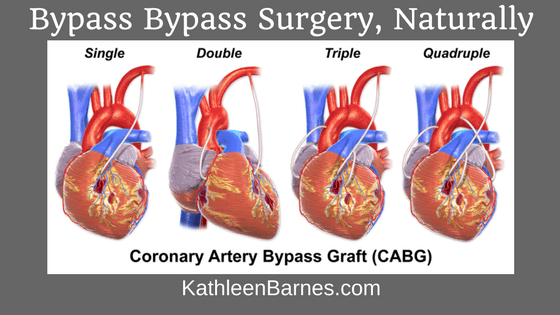It’s a story we hear nearly every day: a man in his mid-fifties develops chest pain and shortness of breath. A visit to his doctor leads to an electrocardiogram (EKG), then an exercise stress test, perhaps later a visit to a cardiologist, more tests, and finally a diagnosis: blocked coronary arteries that require arterial stents or maybe even bypass surgery.
Doctors have even been known to tell a patient he is a “walking dead man.” This happened with my husband 11 years ago, so I know.
I also know how difficult coronary bypass surgery is on the patient. His heart is stopped and blood is circulated through a pump. There are a number of complications from open heart surgery, including blood clots, infection, severe pain at the sites where arteries are harvested (usually the arm and leg), brain damage and depression.
Research shows that less than 1 percent of heart patients who are treated with conventional medications like the statin drugs and beta-blockers die of heart disease within a year of their diagnosis, yet 3.3% of bypass patients die within a year of their surgery. If you’re thinking this doesn’t make much sense, you’re right.
The doctor told my husband that bypass surgery is not a cure for the heart disease that causes the blocked arteries. It’s a temporary fix that may last a few years– or it may not.
All this sounds pretty grim.
The good news is that there is a natural alternative to bypass surgery that is safe, effective, non-invasive and almost side effect-free.
It’s called chelation therapy, and while this isn’t a household word, perhaps it should be.
This simple intravenous infusion of a substance called EDTA (ethylenediaminetetraacetate) in a series of treatments in a doctor’s office has shown remarkable ability to clear toxic metals and stop the calcification that leads to artery-clogging plaque – and even prevent heart attacks in patients who already have serious heart disease.
“EDTA is a synthetic amino acid that removes toxic metals like lead, cadmium, aluminum and arsenic. It also lowers the level of calcium from the bloodstream as well as excessive iron and copper, improving heart function and elasticity of arteries,” says Terry Chappell, M.D. in his book, Questions from the Heart .
EDTA chelation:
- neutralizes free radicals because of its anti-oxidant effects
- stops blood clots
- reduces calcium, preventing hardening of the arteries
- lowers LDL or “bad” cholesterol
- prevents blood vessel spasms by moving more magnesium into the cells
- prevents the formation of artery-clogging plaque by removing toxic metals
- lowers blood pressure by removing lead and reducing blood vessel spasms
Dr. Chappell says EDTA helps improve blood flow to the heart: “EDTA will reduce the plaque to a certain extent and it will make the blood vessels softer and more flexible so more blood can get through.”
Scientific evidence
The scientific evidence is there.
Dr. Chappell recently completed a large chelation study conducted at 8 sites that extracted life expectancies and the possibility of new cardiac events in a group of 221 patients with known cardiac disease, many of whom had already heart attacks and/or bypass surgery.
Based on standard medical projections, this group would have been expected to have 15 heart attacks and 6 would be expected to die in the three-year period.
In fact, none of the patients who received chelation had heart attacks or died.
“This is a huge reduction,” says Dr. Chappell. “In addition, 70% of the patients we treated with chelation said they have no more symptoms of heart disease at all.”
Chelation patients typically undergo 30 or more intravenous infusions of EDTA in a doctor’s office. Those with severe heart disease may undergo 50 or more treatments. Each treatment takes three to fours hours and monthly maintenance treatments are often recommended after the initial treatments are completed.
Chelation therapy may receive greater acceptance from the medical community, if a U.S. National Institute of Health study currently under way shows positive results. In one of the largest studies of its kind, the NIH is recruiting 2,300 patients who have had heart attacks to undergo chelation therapy.
“They’re having some difficulty recruiting patients for the study because no one wants to get the placebo,” says Dr. Chappell.
Dr. Chappell estimates there are approximately 1,000 doctors in the U.S. and Canada who specialize in chelation therapy. You can find one near you through the website of the American College for Advancement in Medicine, www.acam.org.
Chelation therapy typically costs $90 to $150 per treatment, and health insurance companies are unlikely to cover the cost unless there is a diagnosis of heavy metal toxicity.
However, some patients have been able to leverage coverage from the health insurance companies based on the scientific evidence of chelation and the relatively inexpensive cost as an alternative to angioplasty and stents, temporary “fixes” which cost about $18,000 and bypass surgery, costing $80,000 or more.
References:
Chappell, Terry, Questions from the Heart (Hampton Roads, 1995.)
Cranton, Elmer M., Bypassing Bypass Surgery (Hampton Roads, 2001).
Walker, Morton, The Chelation Way (Avery. 1989)
Walker, Morton, Everything You Should Know About Chelation Therapy (McGraw-Hill, 1998.)
Scientific citations:
*prevent heart attacks and much more*
Chappell, LT, Shukla, R, Yang J et al. Subsequent Cardiac and Stroke Events in Patients With Known Vascular Disease Treated with EDTA Chelation Therapy. Integrative Medicine 2005, 2(1): 27-25.
*statistics*
Hannan, EL, Racz, MJ, McCallister, BD, et al.
Three-year survival after coronary artery bypass graft surgery and percutaneous transluminal coronary angioplasty. J Am Coll Cardiol 1999; 33: 63-72.
*antioxidant*
Menasche P, Pinwica A, Free radicals and myocardial proections: a surgical viewpoint. Annals of Thoraci Surgery 1989; 376:939-45
*magnesium*
Hancke C, Flythie K. Benefits of EDTA Chelation Therapy on Atherosclerosis: A Retrospective Study of 470 Patients. Journal of Advancement in Medicine 6, no. 3 (1993) 161-171.
*spasms, plaque, calcification*
Sloth-Neilsen J, Guldager B, et al. Arteriographic Findings in EDTA Chelation Therapy on Peripheral Atherosclerosis. The American Journal of Surgery 162 (1991): 122-25.
Van Rij AM, Solomon C, Packer SG. Chelation Therapy for Intermittent Cluadicat6ion: A Double-Blind Randomized Controlled Study. Circulation 90(3) (Sept 1994)1194-99.
*lower cholesterol*
Lamb DJ, Leake DS, The effect of EDTA on the oxidation of low density lipoprotein. Atherosclerosis 1992; 94:35-42.







